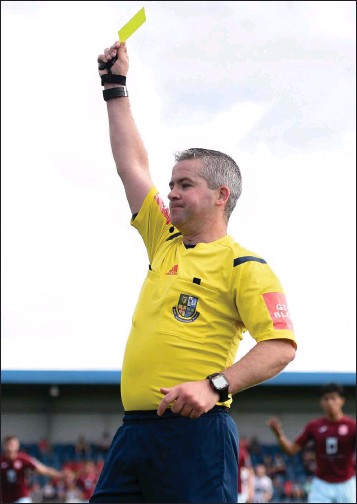by Dave Devereux, from the Wexford People on Tuesday 11th June 2019
I HAD the pleasure of attending the 50th anniversary celebrations of the Wexford Branch of the Irish Soccer Referees’ Society at the weekend as current and former members got the chance to enjoy a well-deserved shindig and let their hair down.
Far away from the pressures of the playing fields there wasn’t a red card in sight, although some of the shapes I was throwing may have deserved an early dismissal from the dance floor.

League of Ireland referee Seán Grant.
Referees have to put up with a lot of criticism, much of it unjustified in my humble opinion.
When things don’t go a team’s way it’s easier to apportion blame to officials, rather than look inwardly to your own side’s shortcomings.
From high-profile managers like Jose Mourinho, who has continually criticised referees at every club he’s been, down to bosses at grassroots level, they almost all seem to have the same inherent distrust of officials.
That said, supporters are often far more culpable than those directly involved in the game, with the barrage of the abuse from the stands and sidelines helping to rile players and management alike.
There has been numerous campaigns highlighting the importance of respecting referees, but sadly that magical word, respect, is still lacking in some quarters.
The easy path is to blame a defeat on the referee and make them the scapegoat, and the lack of regard for the officials is a real curse on the game.
Players too have to take a long, hard look at themselves as they try to deceive by diving or feigning injury, which only increases the odds of the referee making a wrong call. A simple throw-in can’t even be awarded without both sets of players manically waving their arms about looking for the decision to go in their favour.
However, despite strong indications showing the finger of blame can be pointed at players or management, the referee is more often than not cast as the pantomime villain, where every decision is greeted with hisses and boos and jeers of derision from the baying hordes, not to mention a flurry of four-letter expletives coming from all angles.
There’s plenty of evidence to suggest that in the professional game standards are improving all the time, but the know-it-alls will tell you otherwise, as their expert eyes see matters differently.
We’re all human and everybody makes mistakes, but the cold, hard stats are there that show that referees are likely to make far fewer than players, whose misplaced passes, fouls committed or poor decision-making happens more frequently. But why let facts get in the way of the narrative?
If a striker misses a sitter, but follows it up with a goal, they will be rightly praised for their contribution, but the referee has nowhere to hide or no way of making amends. If he or she makes one bad call, followed by a host of correct decisions, in our culture of blame, the focus will be solely on the error.
Of course, it’s not just the ‘beautiful game’ that’s blighted by referee bashing. It happens in every sport, and Sunday’s Leinster hurling championship meeting of Galway and Kilkenny was a case in point. On social media there was a suggestion that the referee had somehow ‘ruined’ the game.
From where I was sitting it was a riveting encounter, so I don’t see how the enjoyment level was diluted in any way. Not to mention that the three players that got sentoff could have little argument with the decisions.
Now I’d be the first to admit that referees don’t get it right all of the time and some make more mistakes than they should, but they try to do a thankless task to the best of their ability and, in the main, do a good job. Standards can always be improved, but being at the receiving end of abuse is hardly a positive climate for change.
We’ve all heard about horrific attacks on referees, and while, thankfully, those kind of vicious assaults are rare, even one is one too many.
I’ve reported on numerous games where the referee barely put a foot wrong, but yet was still unfairly castigated by both teams.
Management and players are bound to feel hard done by on occasion, but constant questioning and berating of officials only serves to heighten tensions and put unnecessary added pressure on the man in the middle.
Those who constantly cast referees as the bad guys might want to look closer to home.
Whether officials are right or wrong in their decision-making, they simply can’t win with some.
The fact is, games can’t be played without them and if prospective referees are put off from taking the brave step on the path to officialdom because of fears of abuse, it’s sport itself that will be the big loser.


